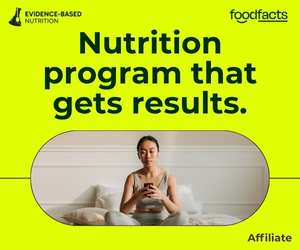
The Glucose Goddess on coffee, milk, and blood sugar levels





Coral Red: Mostly False
Orange: Misleading
Yellow: Mostly True
Green: True
Learn more about our fact-checking policies
Jessie Inchauspé, aka the Glucose Goddess, posted an Instagram video on October 23rd, in which she shares several tips for coffee consumption. She suggests that timing of coffee consumption and milk choice are two significant factors to help with glucose levels.
Avoiding added sugar in daily drinks aligns with evidence-based practices. However, there are no significant health concerns in the general population associated with specific milk choices or with the consumption of coffee before breakfast.
Coffee is a very popular drink, enjoyed frequently and socially by millions of people around the world. It’s important to understand the basis of recommendations to avoid or favour certain products, particularly when those choices might affect one’s daily habits. This step might help to guard against developing unhealthy attitudes towards eating and drinking.

Spot Absolutes: Claims using “always” or “never” are red flags. Health and nutrition are nuanced, not black-and-white.
Let's break down the different tips Jessie shares in this post:
1. Black Coffee and Sugar
The video correctly states that black coffee can be enjoyed as part of a healthy diet. Coffee has several health-enhancing properties. For example, it is rich in polyphenols, a type of antioxidant, and can help to diversify your gut microbiome. However, it’s true that added sugar increases calorie intake, so reducing your consumption is advised. This is particularly relevant in the context of regular coffee consumption, and broadly speaking in the context of Western diets where sugar consumption tends to be too high.
2. Milk Choices
The post then advises avoiding oat or rice milk in favour of dairy milk or unsweetened nut milks. As Jessie states that the choice of milk is “super important,” the underlying assumption is that coffee habits might significantly and negatively impact blood sugar levels and overall health. Before going into the different properties of each milk option, it might be worth pausing to ask the following question: is this a relevant, serious concern? Registered Nutritionist Hazel Long helps us to unpack this information and more importantly, what it means for us as consumers:
It is correct that both oat and rice milk are higher in carbohydrate per 100ml than dairy milk and unsweetened almond milk, and lower in protein than dairy milk. Therefore we would expect to see a slightly larger increase in blood sugar if someone consumes oat or rice milk, in comparison to dairy or unsweetened almond milk. However this data is not particularly informative for people without diabetes as there is currently no strong evidence that glucose variability as a single measure will have an impact on long term health outcomes. The milk added to coffee is a tiny proportion of someone's overall energy intake, and whilst dairy is a nutrient rich option there are plenty of unsweetened plant based milks that provide a suitable alternative and can be fortified with important nutrients for those who choose not to eat dairy.
So, while adding oat or rice milk to your coffee might lead to larger increases in blood sugar than cow’s milk or unsweetened nut milks, some nuance is needed. It is worth remembering that the quality of diet as a whole should be at the forefront of discussions around food and overall health. Ultimately, personal preferences and dietary requirements might guide your decision here, as issues such as sensitivities, allergies and environmental or ethical concerns might also come into play. Beyond its creamy texture, one reason why oat milk has gained in popularity is its environmental benefits when compared with dairy options.
3. Coffee Timing and Glucose Levels
Finally, Jessie advises to wait until after breakfast to enjoy a cup of coffee to help with glucose levels. This might well be true, but is there evidence to support this?
Coffee timing in relation to blood glucose is not well researched. At present there is no long term data that suggests coffee before breakfast has an impact on long term health outcomes. People do respond differently to caffeine consumption so it is worth considering how it makes you feel.
Final Take Away
The bottom line is that there is no one-size-fits-all answer to the question: how should you drink your coffee? Perhaps one thing that stands out when talking to experts is that we should keep in mind long-term health outcomes when discussing issues related to how different foods impact our health. This might help prevent unhealthy attitudes towards food, which can get us to lose sight of the big picture and potentially be detrimental to mental health.
The underlying question that we should address when we evaluate claims about food products and their impact on glucose levels, particularly when we’re talking about minimal intake (i.e. a splash of milk in coffee) is this: for people without diabetes, are glucose spikes a relevant concern when enjoying a cup of coffee? Dr Nicola Guess, a Registered Dietician with a PhD in the dietary management of pre diabetes, addresses this type of question in her blog:
“Even though [Glycaemic Variability] GV can be extremely high in diabetes, it’s still not 100% clear that GV per se is causal in terms of diabetes-related complications. However, there’s a good chance it might be in some way - and quite rightly a lot of research is being carried out to understand this. By contrast, there is no data I am aware of (maybe there is and I just haven’t see it though!) that GV per se is relevant to any health outcome in people without diabetes.”
We have contacted Jessie Inchauspé and are awaiting a response.
Stand Against Nutrition Misinformation
Misinformation is a growing threat to our health and planet. At foodfacts.org, we're dedicated to exposing the truth behind misleading food narratives. But we can't do it without your support.
Sources
Barrea, L. et al. (2021). Coffee consumption, health benefits and side effects: a narrative review and update for dietitians and nutritionists. doi: 10.1080/10408398.2021.1963207.
Guess, N. (2023). “Glucose spikes” and “crashes.” https://drguess.substack.com/p/glucose-spikes-and-crashes
Thomason, C. (2024). What are the health benefits of coffee? https://zoe.com/learn/health-benefits-of-coffee.



foodfacts.org is an independent non-profit fact-checking platform dedicated to exposing misinformation in the food industry. We provide transparent, science-based insights on nutrition, health, and environmental impacts, empowering consumers to make informed choices for a healthier society and planet.

Was this article helpful?
















.svg)
